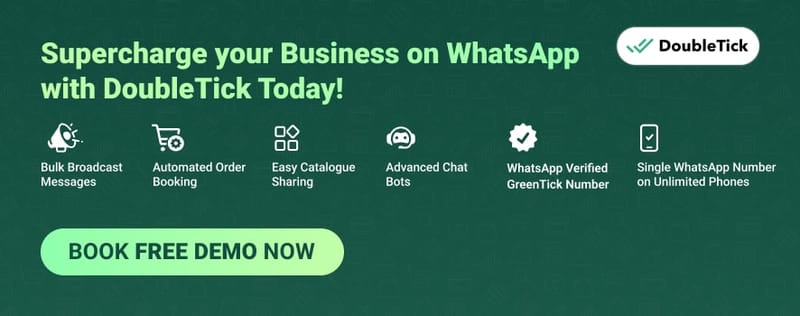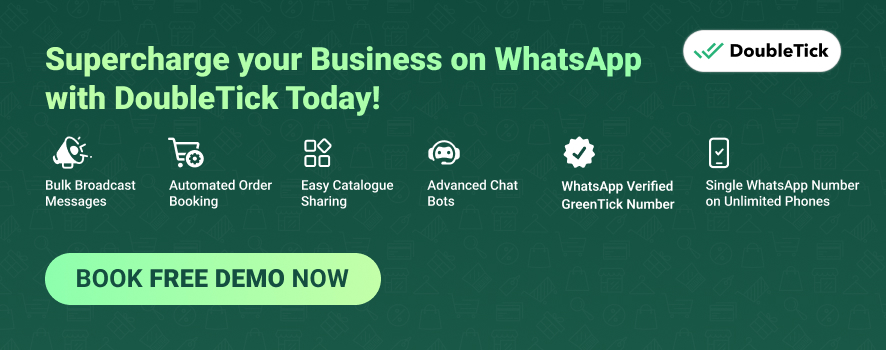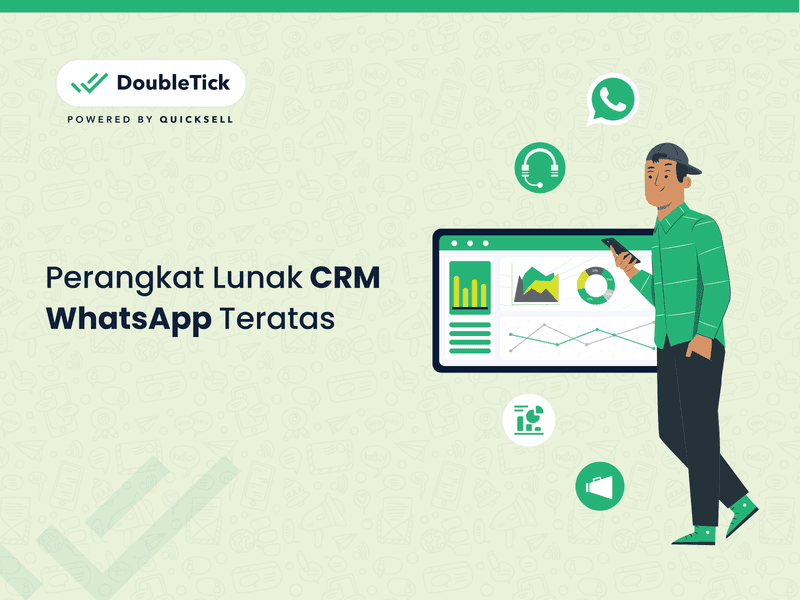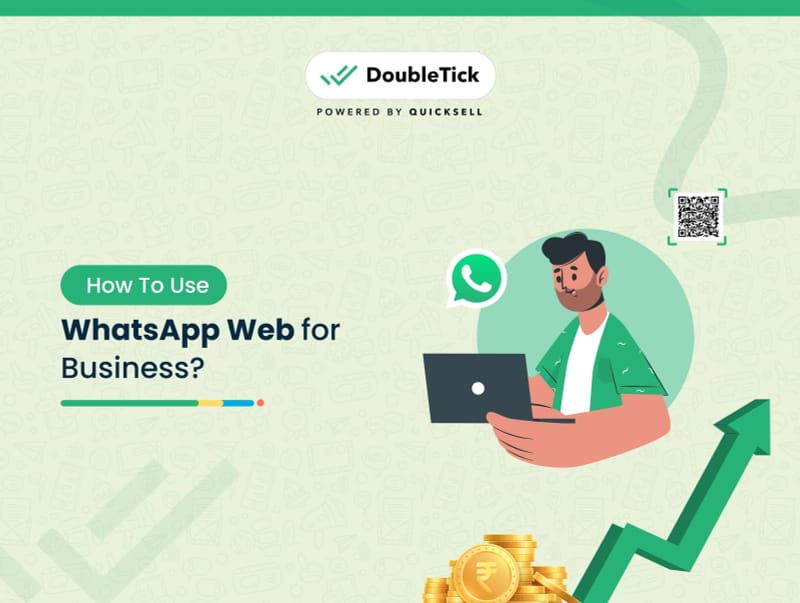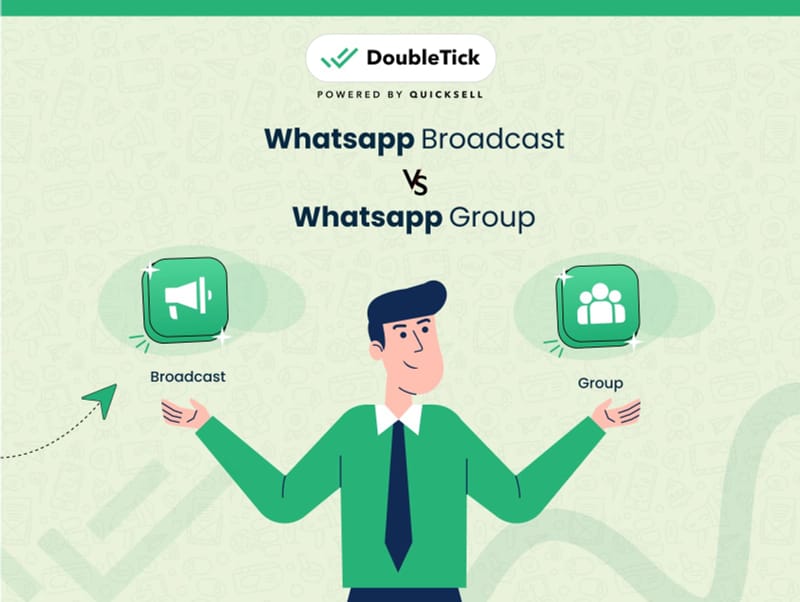Contents
- Understanding WhatsApp Business API
- Benefits of using WhatsApp Business API for Marketing
- How to Implement WhatsApp Business API in Your Social Media Marketing Strategy
- How to Get DoubleTick
- Best Practices for WhatsApp Marketing
- Future of WhatsApp Marketing
- Conclusion: Why You Should Consider WhatsApp Marketing in Your Social Media Strategy
- Frequently Asked Questions
Understanding WhatsApp Business API
The WhatsApp Business API is a powerful tool for marketers to connect with customers. It allows businesses to send personalized messages, automate responses, and manage customer interactions. By integrating this API into your social media strategy, you can take advantage of the messaging app's billion-plus user base.
With the WhatsApp Business API, you can create custom templates for frequently asked questions, order confirmations, and more. This makes it easier for businesses to communicate with their customers in a timely and efficient manner. You can also use messaging analytics to track engagement rates and improve your messaging strategy.
One unique feature of the WhatsApp Business API is its ability to integrate with other platforms like Facebook Messenger and Instagram Direct Messages. This means that businesses can manage all their messaging channels from one place.
Pro Tip: Make sure to always get consent from customers before sending them messages on WhatsApp. This will help maintain a good relationship with your audience while avoiding spam complaints. Get ready to slide into your customers' DMs like a pro with the benefits of using WhatsApp Business API for marketing.
Wanna know about WhatsApp Business API in detail? Here is your 2023 Ultimate Guide to WhatsApp Business API - Click Here to Read
Benefits of using WhatsApp Business API for Marketing
To boost your social media strategy with WhatsApp marketing, delve into the benefits of using this platform for your marketing needs. Higher open rates and engagement rates, personalized communication with customers, and integration with other marketing tools are just some of the advantages that this approach offers.
Higher Open Rates and Engagement Rates
WhatsApp Business API offers higher open rates and engagement rates for marketing campaigns. With over 2.5 billion active users worldwide, WhatsApp is a popular messaging platform that businesses can use to reach customers through the integration of branded content and automated messaging features.
By using the WhatsApp Business API, businesses can create personalized messages that target specific audiences based on their interests and behaviors. This type of messaging creates a sense of exclusivity and relevance for the user, resulting in higher engagement rates. In this matter, a digital marketing agency should leverage the WhatsApp Business API to enhance their clients' customer engagement strategies.
In addition, the WhatsApp Business API also offers rich media capabilities such as images, videos, and audio messages that enhance customer experience. This feature makes it easier for businesses to convey their message effectively, resulting in higher click-through rates.
Furthermore, the inclusion of a video trimmer can help businesses efficiently create and share video content through the WhatsApp Business API.
A unique detail about WhatsApp Business API is its support for instant replies and chatbots that can handle customer inquiries efficiently without human intervention. This feature allows businesses to provide quick responses to customers at any time of the day, improving customer satisfaction and generating more leads.
Pro Tip: To maximize the benefits of using WhatsApp Business API for marketing, businesses should focus on creating valuable content that resonates with their target audience while leveraging automation features to streamline messaging processes.
Get personal with your customers, but not too personal - WhatsApp Business API has got you covered.
Personalized Communication with Customers
Connecting with customers on a personal level is vital in running a successful business. The WhatsApp Business API takes personalized communication to the next level. Businesses can create customer personas, segment their audiences based on variables like interests and location, and use that information to craft customized messages for each group. Whether you want to promote an upcoming sale or notify customers of new inventory arrivals, personalized messaging guarantees higher engagement rates. Moreover, when complemented with Twitter management tools, businesses can maintain a cohesive and personalized approach to customer engagement across various platforms․
Plus, WhatsApp offers a more convenient way for businesses to communicate with customers via chatbots and automated messages. This frees up the time for representatives to engage in more important tasks like closing deals or resolving customer issues. Moreover, with end-to-end encryption features, privacy concerns are minimized. The WhatsApp Business API gives businesses peace of mind that messages sent between them and their customers are secure. This efficient communication platform allows trading businesses to address customer inquiries, all while ensuring the security and privacy of their messaging. Also, you can enhance your trading strategy with personalized swing trading alerts through WhatsApp Business API, keeping your clients informed and engaged.
Personalized Communication is an art that every business should master in order to optimize results and maximize profits- WhatsApp Business API makes sure your art excels while guaranteeing increased engagement rate through tailored messaging and uninterrupted experience by serving notifications instantly. Integrating WhatsApp Business API with other marketing tools is like adding a fancy new toy to your already impressive collection.
How to Implement WhatsApp Business API in Your Social Media Marketing Strategy
To implement WhatsApp Business API in your social media marketing strategy with Setting up a WhatsApp Business Account, Creating and Sending Messages, and Managing Contacts and Groups as solution briefly. By incorporating WhatsApp Business API into your social media marketing plan, you can effectively reach and engage with your audience on a more personal and direct level. Here are the key steps to getting started with WhatsApp Business API: setting up a WhatsApp Business account, creating and sending messages, and managing contacts and groups.
Setting up a WhatsApp Business Account
There are two ways through which you can get WhatsApp Business API:
- Direct sign-up from Meta
- Through a solution provider such as DoubleTick
Directly from Meta
You can directly apply for the official WhatsApp Business API from Meta but going down this path isn’t particularly efficient. If you're a mid-scale company you'd need a developer to set up the API which is too labour-intensive and technically challenging.
Through a Solution Provider
A solution provider will get quick approval and can swiftly set up the WhatsApp Business API platform for you. For instance, with DoubleTick, the process takes between two to three days. With DoubleTick the possibilities to scale your business is endless.
How to Get DoubleTick
Kindly email us at grow@quicksell.co or Click Below to get a FREE DEMO to know about our product offering, features and pricing plans.
Now transform WhatsApp into the ultimate sales engine to delight customers and drive revenue with DoubleTick!
Read more about DoubleTick here - What is DoubleTick and How This Could Be Your Greatest WhatsApp Marketing and Sales Tool
Best Practices for WhatsApp Marketing
To effectively incorporate WhatsApp marketing into your social media strategy, you need to follow the best practices for this platform. Respect privacy and permission of your customers, provide them with value and relevant content, and monitor and analyze your results to optimize your messaging. These sub-sections will guide you on how to achieve success with WhatsApp marketing campaign.
Respect Privacy and Permission
Protecting the privacy of customers is crucial when using WhatsApp Business API for marketing purposes. As a responsible business, you should ensure that customer data is not misused or shared without their consent. Always obtain permission before messaging them and make it clear why they're receiving the message.
When sending messages, avoid sharing irrelevant content or spamming customers. Provide valuable information and relevant offers, such as promotions, incentives, or exclusive content. Limit the number of messages sent per day to avoid overwhelming your customers. You can use a marketing virtual assistant, which can help you with all these marketing activities.
Ensure that all customer data is securely stored and encrypted. Follow industry standards and regulations to prevent data breaches. Inform customers about how their data will be used and give them control over their information.
To respect privacy and permission on WhatsApp, implement opt-ins and opt-outs for customers to have full control over communication with your business. Also, include an option for customers to delete their data at any time if they no longer want to receive messages from your business.
By following these best practices, businesses can establish a strong relationship with their customers by showing that they value privacy and seek to provide a positive experience on WhatsApp Business API. Don't be a spammer, be a value bomber - give your customers helpful content they will remember.
Provide Value and Relevant Content
To succeed in WhatsApp marketing, it is crucial to provide value and relevant content to your audience. Your messaging should serve a purpose and offer something unique to the user. Whether it be an informative article or exclusive discount code, providing value encourages engagement and brand loyalty.
It's essential to understand your target demographic and send them personalized messages. Avoid sending generic messages that will be ignored by the user; take advantage of customer data to craft specific messaging that speaks to their wants and needs. Remember that social media is used by billions of users worldwide, so it's crucial to effectively target your potential clients. Additionally, ensure that your content aligns with your brand's voice and image.
While it's tempting to send frequent messages, avoid bombarding users with excessive updates. Instead, aim for quality over quantity; focus on creating engaging content while limiting the number of messages sent per day or week. If your company is mostly active on social media you can use a LinkedIn carousel generator to create engaging and visually appealing content that stands out to your audience.
Finally, successful WhatsApp marketing requires a genuine connection with the audience. Use creative storytelling techniques or share relatable experiences to build trust with users and evoke emotion in them. By establishing a connection with customers, you can increase conversions and achieve long-term success. To make your WhatsApp marketing efforts even more impactful, craft trending hashtags to amplify your reach.
In one instance, a fitness brand utilized WhatsApp marketing by sending users daily workout routines accompanied by motivational quotes. The messaging provided value while also reinforcing the brand as a reliable resource for fitness enthusiasts. This strategy led to increased engagement and sales for the company, demonstrating the effectiveness of providing relevant content in WhatsApp marketing.
Take a deep breath, it's time to analyze your WhatsApp marketing results and see if they're taking off like a rocket or crashing and burning like a failed science experiment.
Monitor and Analyze Your Results
To make the most of your WhatsApp marketing efforts, it is crucial to monitor and analyze your results. Keeping close tabs on how your campaigns are performing can help you identify areas where you may need to make adjustments or improvements. Here are four key points to keep in mind when monitoring and analyzing your results:
- Measure engagement: Track metrics like open rates, click-through rates, and response times to get a sense of how engaged your audience is with your brand.
- Analyze conversion rates: Look at the number of conversions you're generating from your WhatsApp campaigns so you can determine which messages and strategies are resonating best with customers.
- Monitor feedback: Keep an eye on customer feedback in order to identify any common issues or concerns that may arise during the course of your campaigns.
- Make data-driven decisions: Use the insights you gather from monitoring and analyzing your campaign performance to make more informed decisions about future messaging, targeting, and overall strategy development.
In addition to these key best practices for monitoring and analyzing results, it's also important to remember that every business has unique needs and goals. By paying careful attention to the specific metrics that matter most for your particular business, you can tailor your analysis approach accordingly.
So don't miss out on opportunities for improvement! Whether you're looking to fine-tune existing campaigns or develop new ones altogether, stay on top of your WhatsApp marketing game by consistently tracking and evaluating your results. The data-driven insights will not only inform better decision-making but also positively impact bottom-line results. From small businesses to multinational corporations, WhatsApp Business API proves to be the ultimate wingman in digital marketing.
Future of WhatsApp Marketing
To prepare you for the future of WhatsApp marketing, this section focuses on upcoming features, potential integration with e-commerce and payment services, and emerging trends and opportunities. Discover the latest advancements and enhancements in WhatsApp Business API that can help boost your social media marketing strategy.
Upcoming Features and Updates
The future of WhatsApp marketing is looking bright, with several upcoming features and updates to keep an eye on.
- There will be improved message templates that can be customized and personalized for more effective communication with customers.
- Businesses will have the ability to send messages to customers who have opted-in using the HSM (Highly Structured Message) feature.
- The introduction of quick replies and frequently asked questions (FAQs) will streamline customer service.
- Automated messaging options will allow businesses to set up pre-written messages triggered by specific actions.
- Verified business accounts will be introduced to help build trust between businesses and customers. Lastly, it is rumored that a payment option may be added in the future.
In addition to these exciting developments, it is important for businesses to remember some key suggestions:
- Ensure all message content is relevant and adds value for the customer.
- Use personalization features like custom fields or emojis for a more engaging experience.
- Make sure your messages are timely - don't let too much time pass before responding.
By taking advantage of these upcoming features and keeping these suggestions in mind, businesses can take their WhatsApp marketing strategies to the next level and build lasting relationships with their customers.
Looks like soon you'll be able to swipe right on a product and left on your bank account, thanks to the potential integration of WhatsApp Business API with e-commerce and payment services.
Emerging Trends and Opportunities
The use of WhatsApp Business API has been steadily increasing for marketing purposes. One emerging trend is the integration of AI chatbots to provide instant responses and improve customer service. Another opportunity is the ability to personalize messages and target specific audiences with the use of CRM tools.
As businesses look to expand their digital presence, WhatsApp Business API offers a unique way to connect with customers in real-time. Its growing popularity can be attributed to its features such as automated messages, frequently asked questions, order notifications, and even payments. Brands can take advantage of these features to offer a seamless customer experience.
It's worth noting that WhatsApp Business API usage is still limited in some regions due to regulatory laws surrounding messaging apps. However, as more companies adopt this platform for marketing purposes, it's expected that regulations will soon catch up. Businesses that delay adoption risk missing out on an increasingly popular marketing channel.
Embrace the power of WhatsApp marketing, or be left behind with a phonebook full of useless contacts.
Conclusion: Why You Should Consider WhatsApp Marketing in Your Social Media Strategy
As social media continues to grow, brands need to keep up by expanding their marketing strategies. WhatsApp marketing can provide the boost you need and give your brand a more personal touch. With its simple interface and easy-to-use tools, the platform allows businesses to interact with customers directly.
Through automated messaging, notifications, surveys, and one-on-one conversations, businesses can form strong relationships with their audience and offer personalized experiences. Additionally, WhatsApp offers end-to-end encryption for communication security.
Using WhatsApp marketing in combination with social media can help businesses increase engagement, establish trust with their audience, and ultimately drive sales. It's a powerful tool that should not be overlooked.




